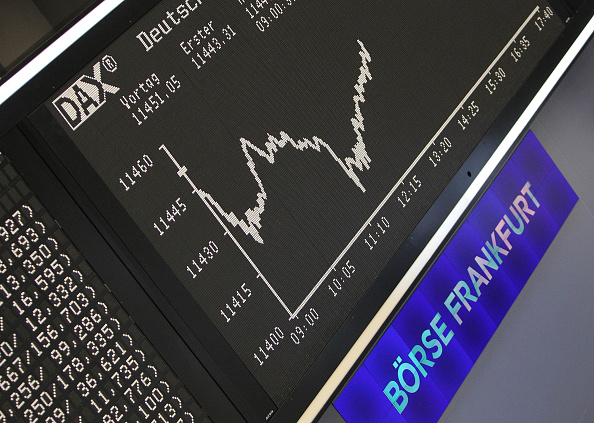European stock markets fall as oil worries shake investors

European stock markets have fallen this morning as investors sell so-called risk assets following a severe spike in the price of oil due to a drone attack on a Saudi Arabian facility.
Read more: Saudi Arabia oil facilities engulfed in flames after drone attacks
The attack, believed to have been carried out by Yemen’s Houthi rebels, pushed up the cost of Brent crude by as much as 20 per cent to $72 this morning before falling back. It was the biggest daily rally since Brent futures started trading in 1988.
“The attacks present yet another headwind for a global economy that is already buffeted by deteriorating manufacturing activity and elevated trade tensions,” said Mark Haefele, chief investment officer at UBS Global Wealth Management.
European investors sold stocks this morning in favour of so-called safe-haven assets. The German Dax index was down 0.6 per cent this morning, France’s CAC 40 was also 0.6 per cent lower, while the pan-European Euronext 100 was also down 0.6 per cent.
Britain’s FTSE 100 was 0.1 per cent down, buoyed somewhat by the falling pound. Sterling has dropped 0.6 per cent this morning as Prime Minister Boris Johnson heads to Luxembourg to see outgoing European Commission president Jean-Claude Juncker for the first time. Traders and political pundits are expecting the meeting to be unproductive.
The FTSE was also lifted by UK oil companies BP, which had risen 3.9 per cent, and Shell, which was 2.9 per cent higher. Up to five per cent of the world’s oil supply is believed to have been knocked out by the attack.
Michael Hewson of online trader CMC Markets said: “Investors appear to be weighing up the consequences of a number of different factors, including the likely reaction function of the US to an attack on one of its key allies in the region.”
Traders were also considering “a possible retaliatory strike against Iran, and the longer term effect such a loss of capacity might have on a global economy,” Hewson said.
The uncertainty has sent investors fleeing towards safe assets such as the Japanese yen, which was 0.3 per cent higher this morning against the dollar, and gold, which had risen one per cent to $1502.75.
Yields, which move inversely to prices, on super-safe government bonds also fell. The yield on the US 10-year Treasury was 7.4 basis points (0.074 percentage points) per cent lower this morning, while the yield on Germany’s 10-year bond was down 3.7 basis points
Russ Mould, AJ Bell Investment Director, said: “Whoever arranged the attacks on Saudi Arabia’s oil infrastructure knew what they were doing.”
“The assault came straight after Riyadh had appointed the syndicate for the stock market flotation of its national oil company, Aramco, and US President Donald Trump had sacked his most aggressive foreign policy adviser, John Bolton.”
“If oil were to make further big gains for any reason – such as another attack – then that would be a potential danger to the global economy and financial markets.”
Read more: Energy giants’ stocks rise after drone attack makes oil price spike
Yet “in the event of a wider Middle Eastern conflagration petrol and share prices would probably be the least of our worries,” Mould said.